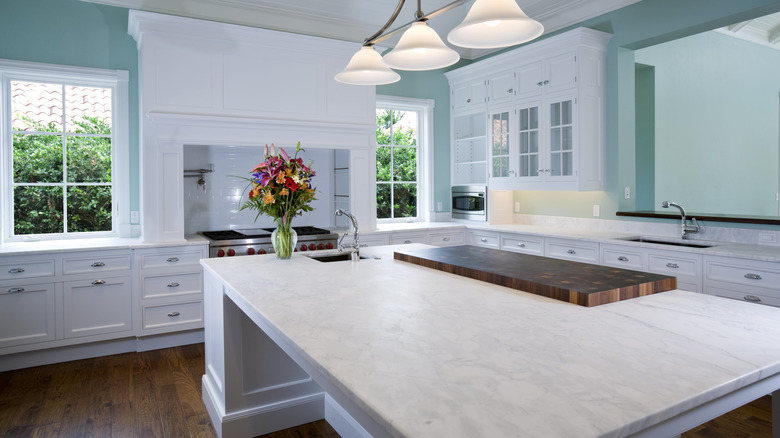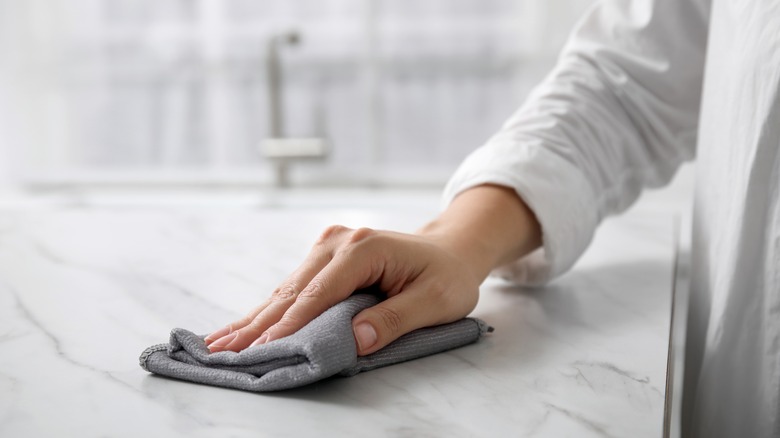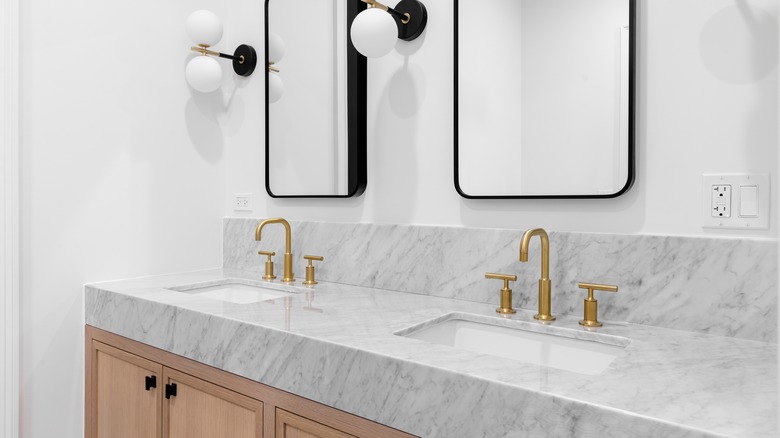Marble Countertops And Vinegar Don't Mix - Here's Why
Think you can scrub down anything and everything with your tried-and-true bottle of white vinegar? Not so fast. There are several things vinegar isn't ideal for cleaning and marble countertops are among them. What's the big deal? "Acids are the enemy of any stone but especially marble," says Welberson DosSantos, director of operations for NYC Marble Care, during an Architectural Digest interview. Marble is softer and more permeable than other countertop materials, so anything containing acid — from vinegar to lemon juice — should be kept away, for cleaning or otherwise.
What happens if you do get acidic liquids on a marble countertop? At the very least they can ruin the sealant protecting the stone, but in a worst-case scenario, vinegar can etch or pit the surface leaving your costly countertop looking far from its best. The good news is that learning to care for marble really isn't that complicated once you know the ins and outs.
How to care for marble countertops in your home
In addition to vinegar, cleaning your marble with bleach and other types of harsh cleaners can be detrimental to the sealant and finish. Instead, using another cleaning staple most people keep on hand — mild dish detergent — is the recommended method for gentle cleaning. Welberson DosSantos also notes that Zep and Weiman products made for stone are also options if you want a pre-mixed cleaner, while Simple Green Granite & Stone is a eco-friendly alternative.
Soft sponges, dish towels, and microfiber cloths are safe bets to apply cleaning solutions to your countertops. If you want them extra clean, rinse with plain water taking care to wipe up any excess moisture. Plastic scrubbers can be gently applied to remove stuck-on food and gummy spots but stay away from anything more abrasive.
To keep the marble countertops in your home looking their best, the sealant needs to be reapplied regularly. If your marble is in good shape without damage, this is an easy DYI project. If your marble is showing signs of deterioration, restoring and resealing is a task best left to the professionals.
Handling and preventing spills on marble countertops
If you happen to spill something acidic or oily on your marble countertop, it is recommended to wipe it up immediately and clean the surface with mild soapy water. Better yet, take care to avoid drips and spills in the first place by using trays with silicone or rubber feet (to avoid scratching your marble) or a wooden cutting board as a base for containers that might leave an unsightly ring on your countertop.
Another thing to keep in mind when cleaning other nearby surfaces is that spray bottles and cans sometimes drip, and you might not realize you've damaged the surface of your marble until it's too late. Products like lime scale remover for faucets, or chemical-based cleaners to tackle extra dirty stovetops, are prime examples of these types of cleaners. Be sure to sit the bottle or can on a somewhere other than your prized countertop while you're cleaning, and work carefully to avoid splashes that can damage your marble. With a little extra care you can enjoy the beauty of marble surfaces in your kitchen or bathroom and keep them looking their best.


